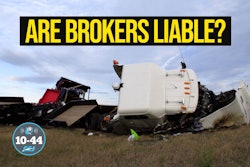Spoliation [‘spo-le-‘a-shen]: noun
1. The destruction, alteration or mutilation of evidence, especially by a party for whom the evidence is damaging.
2. Potentially big trouble for motor carriers that fail to retain driver logs, electronic control module or satellite-tracking data, or other information that might be relevant to a catastrophic accident.
Editor’s note: This is the sixth and final installment in CCJ’s The Cost of Risk series.
You experience a catastrophic accident, and a lawsuit against your company goes to trial. After both sides present their cases, the judge tells jurors that because you didn’t download data from the truck engine’s electronic control module (ECM) they are free to conclude that the data was damaging to your company’s case.
That kind of jury instruction is frightening and may sound unfair, but it’s hardly unusual. In virtually every jurisdiction in the nation, your failure to preserve evidence deemed material to the case could lead to a scene such as the one above.
Few trucking companies relish capturing and preserving data that might imply or confirm their driver’s fault in a catastrophic accident. There can be doubts about reliability or concerns about information being taken out of context. But many attorneys who represent trucking companies would much rather argue a case complicated by the presence of adverse information than defend their clients’ decision not to collect and retain it. The legal term for destroying evidence that might be damaging is spoliation, and defense attorneys in civil cases dread few things more.
Spoliation isn’t limited to electronic data. A carrier invites trouble if, for example, it discards a driver’s logs relevant to the accident once the regulatory minimum period elapsed. But carriers seem particularly susceptible to spoliation claims involving data from engine ECMs, trip recorders and event data recorders (EDRs). There are no clear rules regarding what data must be preserved following a major accident. Crafty plaintiffs’ attorneys may demand all manner of documents and data during discovery. Then they use the non-existence of that information against the carrier during the trial. The carrier is especially vulnerable if its handling of data and documents departed from its usual practice. Whether carriers adopt clear policies on what information to obtain after a major accident or deal with the issue on a case-by-case basis, consistency is critical.
Being a spoilsport
Many defense attorneys recommend that carriers preserve everything they have related to the driver and the truck, including ECM and positioning data. “The consequences of the suggestion to the jury that a company was engaged in some sort of cover up are worse than any evidence that might be revealed in any records they preserve,” says Clay Porter, a partner in the firm Dennis, Corry, Porter & Smith. To make his point, Porter declares that he would rather defend a carrier whose driver, according to satellite positioning data, blatantly violated hours-of-service rules and falsified his logs than a carrier that prematurely destroyed data related to the accident.
Most trucking defense attorneys probably would agree. In June, Keith Dunlap, president of claims administration firm NTA Inc., surveyed 18 trucking defense attorneys on whether carriers should collect ECM and trip recorder data following a serious accident and whether carriers should preserve that data even if it is adverse to their case. Twelve of the 18 said they would generally recommend collection and preservation for various reasons, including a desire to avoid a spoliation claim or to know as much as possible about the case. Most of the other attorneys said it was either a close call or that it would depend on specific facts.
While it’s scary when a judge tells jurors they can assume your company is hiding something, the consequences of spoliation can be even worse. “In many states, the courts have allowed plaintiffs to use spoliation as an independent cause of action,” says Michael Langford, a partner in the firm Scopelitis, Garvin, Light & Hanson. A plaintiff could win damages just by establishing that you destroyed evidence. Even if none of the evidence that exists points to your responsibility, you could pay dearly. The number of states recognizing spoliation as an independent cause of action is growing, Langford says.
Spoliation clearly is bad news. But is failing to preserve ECM or positioning data spoliation? The idea behind spoliation is that a company can’t destroy evidence that it has the duty to preserve, says attorney Porter. For example, because a carrier has a duty to preserve driver logs for 180 days, destroying those files earlier than that is spoliation. In fact, you probably will face a spoliation charge if you destroyed the logbook on day 181 if you had reason to anticipate litigation.
But the law can be vague about when the duty arises, Porter says, adding that plaintiffs’ attorneys often seek to entrap unwary motor carriers with overreaching document retention demands. “It’s one of the more insidious abuses of the legal process and requires careful attention to avoid,” he says.
To an extent, carriers help determine whether there is a duty to preserve by their own practices and policies. At Gaston, S.C.-based G & P Trucking, for example, the policy in the event of a catastrophic accident is to preserve any information it has, says Ben Harman, director of safety. Although Harman hasn’t experienced a catastrophic loss in three years at G & P Trucking, the company’s policy is to preserve evidence in its possession. Harman would have a 30-day positioning report on the truck printed and separate out the driver’s logs, vehicle condition reports, records of preventive maintenance and repairs and the driver qualification file. The company also would download the data from the engine’s ECM.
D.M. Bowman has no policy at all on preserving ECM or vehicle tracking data. “The absence of a policy is different than a policy not to do it,” says Mike Connelly, chief safety officer of the Williamsport, Md.-based carrier. “A policy not to do it will get you in trouble. A policy to do it, and you don’t do it, will get you in trouble. The absence of a policy is something we can work with.” Without a policy, an attorney could make a case against a spoliation claim, he says, “that could probably be won.”
Regardless of your practice, be consistent. “If you have a policy, follow it religiously,” Langford says. “If you decide to go on a fact-by-fact basis, if there’s ever a doubt, download.”
Knowing the truth
Avoiding a spoliation claim isn’t the only reason to preserve all available information, however. “The longer I’m involved in this process, the more I come to the conclusion that I would rather know what I’m dealing with,” says John Pion, a partner in the firm Dickie, McCamey & Chilcote. For example, the evidence may point conclusively to the carrier’s fault. “That completely alters the strategy,” Pion says. In that case, the best course of action is to approach the family and do what’s right with a reasonable settlement offer, he says. “Most of the time you can avoid litigation.”
Knowing the truth also helps in dealing with the driver. “Before my driver says he didn’t do anything wrong, I want to know if the physical and electronic evidence supports that
conclusion,” Pion says. “If it doesn’t, I don’t want him to take a position that’s contrary to the evidence. People become inflamed when others do not accept responsibility.” But Pion also points out that the reverse sometimes occurs. Overcome by the tragedy, drivers may blame themselves unfairly. Presenting them with objective evidence to the contrary helps break through that guilt.
There’s another rationale for worrying more about spoliation than incrimination, Porter argues. “If a trucking company does something wrong and is negligent, it doesn’t get away with it.” Other evidence likely will point to the carrier’s fault, so the electronic data probably won’t make or break the case.
Gordon Lambert, vice president of safety for C.R. England, agrees. “If there’s something incriminating in the data, there will be something incriminating elsewhere,” he says. Still, C.R. England remains undecided on preserving ECM data, he says. The company lacks total confidence in ECM reliability and worries about misuse of the data. “Plaintiffs’ attorneys have a way of taking data and twisting it,” Lambert says.
Legitimate concerns
Lambert’s worries over reliability and, especially, misuse of data by plaintiffs’ attorneys are common in the industry and lie at the heart of the controversy over retaining electronic data. And the concerns have merit: knowing what the data says does not necessarily mean knowing the truth.
Data obtained from an ECM is only as good as the parameters programmed into it, says Marty Fletcher, director of technology, equipment research and development for U.S. Xpress Enterprises. For example, fleet managers must be sure to program the correct tire size into the ECM because tire revolutions are the basis on which ECMs calculate speed, Fletcher says. Mistakes like that are more common than you might think, he says. Even a worn tire tread – 4/32nds instead of 30/32nds, for example – could mean a difference of up to 2 mph between recorded speed and true speed. That probably wouldn’t make or break a lawsuit, but it could mean that the ECM shows a driver as being 1 mph over the speed limit when he really is 1 mph below it, Fletcher says.
Glitches can and do occur. Fletcher recalls finding that according to ECM data, U.S. Xpress drivers sometimes would instantly achieve speeds of 110 mph from an idle. He discovered the cause to be a movement of the transmission shifter while the engine was running but parked.
Misinterpretation or mischaracterization of data also is a real concern. For example, in one lawsuit, the plaintiff’s attorney used electronic data obtained in discovery to suggest that a truck driver had a history of frequent hard brakes, says Bill Gouse, vice president of engineering for the American Trucking Associations. In reality, this supposedly damning evidence resulted from nothing more than the fact that the carrier’s yard had a loose gravel surface. Trucks would skid slightly on the gravel, causing multiple antilock brake system activations each time drivers entered or exited the yard, Gouse says.
So pick your poison. You can risk having flawed or misinterpreted data – or accurate but incriminating data – presented in court. Or you can risk a plaintiff’s attorney claiming that you destroyed evidence. Neither is an attractive proposition, but most defense attorneys would rather cope with unfavorable data than defend the carrier that chose not to keep the data at all.
Two-way street
Often, you can get other vehicles’ data
When you consider electronic data relevant to an accident, you probably think of information generated by a truck engine’s electronic control module (ECM) or satellite tracking system. Indeed, one of the concerns motor carriers have with gathering ECM data is that it only tells one side of the story. But in many cases, it doesn’t have to be that way. If other vehicles in an accident are either a General Motors vehicle built in the last 10 years or a late-model automobile of virtually any make, there probably is an event data recorder (EDR) of some type on board. Like a truck engine’s ECM, the purpose of the automobile’s EDR may not be accident reconstruction, but the data is frequently used for that purpose.
Automobile EDR technology has advanced in recent years, notes Steven Rickard, who heads Harrisburg, Pa.-based accident investigation firm Steven W. Rickard & Associates. The air bag systems on General Motors cars have had some form of EDR since 1990. The data parameters measured nearly doubled in 1994, adding some important elements such as whether the driver’s seatbelt was buckled, Rickard says. Since 1999, the air bag EDR on GM cars tracks 16 separate parameters, including vehicle speed and braking.
GM is no longer alone. Air bag EDR downloads are also possible on some Ford Motor Co. models built since 2001, including the Crown Victoria, Grand Marquis, Town Car and Windstar, Rickard says. And the National Highway Traffic Safety Administration estimates that essentially all 2002 model year passenger cars and other light vehicles have some recording capability and that more than half record crash pulse data or similar information.
The EDR information from automobiles can be extremely useful in preparing for a lawsuit, says attorney Michael Langford, a partner in the firm Scopelitis, Garvin, Light & Hanson. Before you leap at the opportunity to secure the event data from automobiles involved in a catastrophic accident, however, recognize the consequences. You will be expected to collect your truck’s ECM data as well. “You can’t have it both ways,” Langford says. “You can’t have an accident reconstructionist downloading the car’s data and not downloading yours.”
Untamed frontier
Highway event recorders lack standards
Most modes of transportation – airlines, railroads and even cruise ships – operate under specific and detailed standards for what event data recorders (EDRs) must measure, how they can be used and who owns the data. Regulations even specify how the EDR itself is to be protected against damage in an accident. But in the highway environment, the only rules are what judges and juries establish by their varied and conflicting verdicts in civil and criminal litigation.
There are no federal regulations concerning EDRs on automobiles, trucks or buses. In October 2002, the National Highway Traffic Safety Administration took its first small step in that direction by requesting comments on a variety of safety benefit, technical and privacy issues that would need to be resolved. The effort may someday yield regulations, “but I wouldn’t hold my breath,” says Joseph Osterman, director of the Office of Highway Safety at the National Transportation Safety Board. The privacy and ownership complications mean that regulations are years in the future, he says.
Even NTSB hasn’t called for mandatory EDRs on automobiles or commercial trucks other than devices for electronic monitoring of hours-of-service compliance. The board has, however, recommended mandatory EDRs on school buses and motorcoaches.
Absent government regulation, another way to gain more certainty over the rules governing EDRs is to establish industry standards. Both the Institute of Electrical and Electronics Engineers and the Society of Automotive Engineers have efforts underway to establish EDR standards, primarily for light vehicles. SAE’s truck and bus group likely will tackle the challenge of EDRs for commercial vehicles.
Osterman urges the trucking industry to embrace private-sector efforts through SAE to set standards and establish certification requirements for individuals who attempt to collect and interpret data. Without either private standards and certification or government regulation, Osterman says, “the judicial litigation system will take over and dictate who owns the data and how it can be used.”






